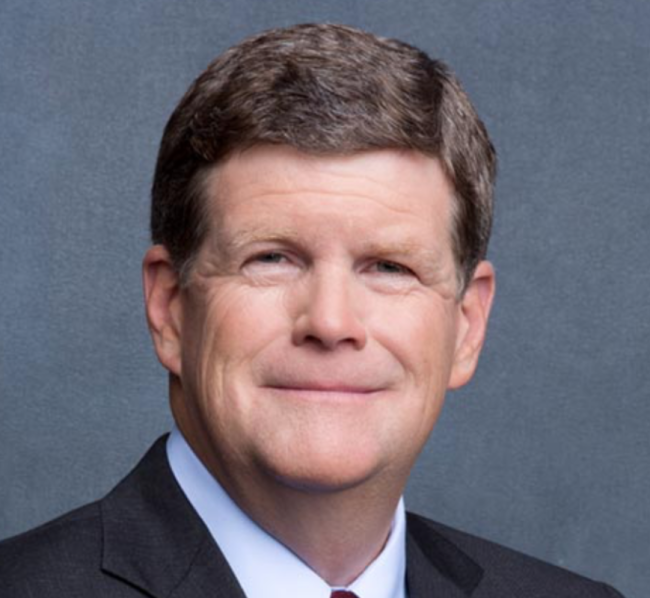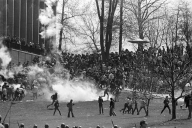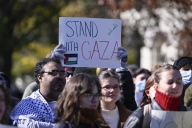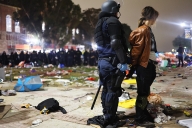You have /5 articles left.
Sign up for a free account or log in.

President Paul J. McNulty
Grove City College
Grove City College’s Board of Trustees recently said that it had formed a committee to investigate allegations of “mission drift” on campus and recommend remedial actions where necessary.
In the same statement, the board recommitted the college to “a free society, traditional values, and the common good” and denounced critical race theory and other “critical” schools of thought as antithetical to Grove City’s Christ-centered mission and values.
The board’s review follows months of dueling petitions and statements from faculty members, parents and other campus groups about how the Pennsylvania Christian college is approaching diversity, equity and inclusion. In particular, the college has been accused of being “woke” and of peddling CRT.
“From what we’ve observed, a destructive and profoundly unbiblical worldview seems to be asserting itself at GCC, threatening the academic and spiritual foundations that make the school distinctly Christian,” reads a petition signed by several hundred Grove City parents and alumni.
“That worldview is critical race theory,” the petition continues, which “denies our fundamental equality, dividing humans into two categories, oppressors and the oppressed. If you are white, your nature is intrinsically racist, even if you don’t know it.”
A similar open letter to trustees from an unknown number of anonymous faculty members assigns particular blame to President Paul J. McNulty, a Grove City alumnus, former trustee and one-time deputy attorney general in the George W. Bush administration.
“President McNulty’s approach to the issue of race has alienated the core constituency of Grove City College,” the anonymous letter says.
‘Do I Teach at a Woke School?’
The criticism of Grove City under McNulty, post-2020, reflects the national debate over how students should learn about race and racism in U.S. history and society, but it also brings up specific campus-based issues. These latter objections include McNulty’s establishment of an Advisory Council on Diversity, a two-week chapel and speaker series on “Justice, Race and Reconciliation,” a new elective education course on cultural diversity and advocacy, and alleged comments made by Justin Jose, director of multicultural education.
A parent quote included in the petition, for instance, says that Jose—who declined comment for this story—“told the class last year that being a non-CRT white person automatically makes you a racist, is also walking around campus regularly with a LGBT rainbow mask on. Why is this person an employee of GCC? Has anyone brought this to the attention of the administration?”
Another quoted parent takes issue with the new education elective, EDU 290, including scholar Ibram X. Kendi’s book How to Be an Antiracist on its syllabus. “The book is pure CRT,” the unnamed parent says. “When I questioned a professor on campus about this course, he defended it by saying it’s better for us to teach our kids how to think and engage with topics we agree and disagree on, then leave them to figure it out on their own. At face value I totally agree, but developing a class using that book as the text gives too much credibility and focus to the topic.”
In an essay called “Do I Teach at a Woke School?” published by Grove City’s Faith and Freedom Institute, Carl R. Trueman, professor of biblical and religious studies, wrote that “at the center of the storm surrounding GCC was an invitation to Jemar Tisby to speak in chapel. Hindsight is 20/20, of course, and in retrospect inviting Tisby to give a chapel address may have been a mistake,” as a chapel address “carries a certain institutional imprimatur that a simple guest lecture does not, though inviting guest lecturers to campus to engage our students on critical topics such as race, in this current culture, is an important role of any college or university.”
Trueman goes on to say that Tisby—a 2020 chapel speaker and author of the book The Color of Compromise: The Truth About the American Church’s Complicity in Racism—appeared to have undergone a “radicalization,” based on his on-campus message.
Neither Tisby’s Grove City comments (which are available in full here) nor the inclusion of Kendi’s best-selling book in an elective course would likely raise eyebrows on many campuses. But Grove City has long been known as one of the most conservative religious colleges in the country, one which the board in its recent statement called an “oasis” in higher education. Its student body is 92 percent white, and many of its undergraduates come from private Christian high schools or were homeschooled.
But this doesn’t mean that Grove City is walled off from greater society, or that its students enter a different world from their peers at other colleges once they graduate. Or that a Christ-centered education isn’t about grappling with some of the dominant culture’s biggest questions. For these reasons, many on campus openly support McNulty and Grove City’s overall direction.
Dozens of professors recently signed their names to a letter in the college newspaper objecting to the anonymous faculty letter’s “misunderstandings, half-truths and statements made without evidence.”
‘The World Will Know We Are Christians’
“Such an anonymous letter with its bold claims based on insinuations and distortions is not the way Christians should address concerns in an organization,” the signed faculty letter says, expressing “full confidence” in McNulty’s leadership style. “This whole matter is providing an occasion for us at GCC to show our love for one another and by doing so—as Christ assures us—the world will know we are Christians.”
Warren Throckmorton, a professor of psychology at Grove City who signed the letter in the student newspaper, said in an interview that he’s probably “left of center” for Grove City, but that there are “a number of faculty, particularly in [professional] departments, who know our graduates need to know this before we send them out into their professions and work. And we’re really not that far afield from some of our board members.”
He noted that Ed Breen, chair of Grove City’s board and CEO of DuPont, rejected what Breen described as “racism, injustice, inequity and violence in our society” following the killing of George Floyd.
“It’d be great if our students could work at his company,” Throckmorton said of Breen.
Cedric Lewis, an adjunct professor of law at Grove City who co-teaches the new diversity course, said the class has nothing to do with CRT, a concept that originated in legal studies, and which has become a catchall for potentially uncomfortable discussions about race generally. Lewis, who described himself as Grove City’s only Black faculty member, also said that no one who has publicly criticized his class has taken it or even talked to him about it. Kendi’s book is far from the only reading on the syllabus, or the only perspective presented, he said, for instance.
“The purpose of the course is really to talk about some of these racial issues in a nonthreatening situation, where we can have open, honest discussions, diverse points of views, and really look at it from a Christian perspective, because that’s what we do at Grove City College,” Lewis said of EDU 290. “It’s primarily in the education program, that’s where it’s held, although it’s open to any student.”
Lewis added, “Honestly, the whole CRT thing, to me, is much more political than it has anything to do with my course.”
In a written statement addressing the issues raised in the first petition, McNulty, the president, said, “Those familiar with Grove City College know that we take our commitments seriously. We mean what we say, and we stick to our principles. My job as president, for which I am accountable to the Board of Trustees, is to ensure that our faculty and staff are missionally aligned.”
Quoting the petition itself, McNulty said that Grove City’s leaders stand “ready to address any pernicious ideologies that truly ‘threaten the academic and spiritual foundations of the college.’” Regarding critical theory generally, he added, “we do not accept it as a proper framework for examining and understanding the real challenges faced in our fallen world today. We affirm that every human is made in the imago Dei, the image of God, and should not be defined by ideological categories.”
‘A Short Time to Help These Students Get Ready’
In an interview, McNulty said he’d have to limit his comments as to not interfere with the board’s pending review. Asked about his approach to his work, and balancing Grove City’s values with its duty to prepare students for life postgraduation, he said this:
“It may sound very idealistic, but in this work, you wake up every day thinking, ‘Gosh, we only have a short time to help these students get ready for the world. How do we want them to live in the world? How do we want them to think and act?’”
McNulty continued, “We want them to be caring, thoughtful people who are well aware of the issues and will be agents for truth and good—people who will promote the best, which we think Christian truth provides. And, essentially, that comes down to loving God and neighbor.”
Trueman, the author of the “woke” college essay, told Inside Higher Ed that while he never believed that “wokeness” was a “significant issue” within the Grove City campus culture, he was pleased that McNulty and the board were “now addressing the concerns raised by others to see if there are areas where we can do better on the hot-button issues of our day.”
It’s “not easy to address the hard questions of race, diversity, et cetera, as posed by wider society while avoiding the ideological excesses and recriminations that currently mar all sides of the American political and cultural landscape,” he also said. “But we need to teach our students, by precept and example, how this can be done—and done in accordance with our school’s mission. And all signs are that President McNulty and the board intend to do just that. I am very encouraged at this point.”
Tisby, the historian of race and religion whose chapel speech offended some, said via email that “some colleges are leaning into ultra-conservative stances on racial justice in the hopes of appealing to similarly conservative parents and students. So for them, addressing CRT as if it is an actual threat to Christian education can help with student recruitment, alumni and parent support and fundraising.”
Other Christian colleges and universities, meanwhile, “may decide that advancing the cause of racial justice and acknowledging that racism continues to exert pressure in systemic and institutional forms today is part of what it means to fulfill their Christian mission,” he said. Those institutions will have to navigate the “fraught conversation about racism within predominantly white Christian schools,” he added, and “undoubtedly face accusations of Communism, Marxism, and ‘going liberal.’”
At the same time, colleges and universities that commit to the “difficult but necessary work of addressing present-day racism are the ones that will draw more Black students and other students of color and provide environments for generative discussions about racial justice.”









